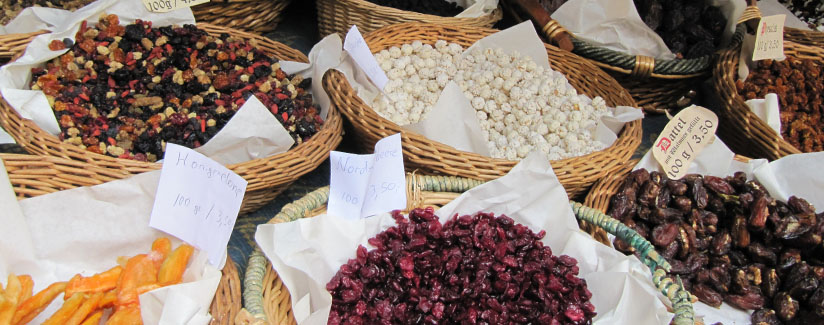
Should I Avoid Food With Ingredients I Can’t Pronounce?
Try to imagine this conversation:
Grocer: “Can I help you find something?”
Shopper: “Why, yes! I’m looking for sodium aluminosilicate, butylated hydroxyanisole, and potassium metabisulfite.
Grocer: “Sure! Right over here!”
Frankly, we don’t know anyone who would have these items on a grocery list. Heck, most of us probably can’t even pronounce them without some tutoring from a food scientist. But it’s likely you’ve consumed these ingredients if you’ve ever eaten grated cheese or cereal, or enjoyed a glass of wine.
What do you know about the additives in your food? Particularly, those mysterious ingredients on the label that have us all scratching our heads and wondering “Is this stuff good for me and my family?”
Adding to that concern – some additives are banned in other countries but not in the U.S. For example, citing health reasons, Europe and Japan have banned brominated vegetable oil, or BVO, a chemical used to distribute flavor in popular bottled drinks like Gatorade and Mountain Dew. (Editor’s note: PepsiCo Inc. is removing BVO from its Gatorade sports drink in response to customer complaints.)
Today’s consumer certainly is more label conscious – and that’s good. But when we don’t know the lingo and can’t decipher the gobbledygook, labels are rendered meaningless. We end up making purchases with less confidence and cross our fingers that what we’re about to eat is safe.
Should we consume foods with ingredients we can’t pronounce? Just because you’re not familiar with an ingredient, doesn’t necessarily mean you should avoid it, according to Dr. Robert Gravani, a food scientist professor at Cornell University.
“Companies don’t just add products or substances just for the sake of adding,” said Gravani during an interview on National Public Radio’s “Talk of the Nation.” “They have some functional purpose in the production or preparation or the appeal of that particular product to consumers.”
Additives are used in foods for very specific purposes, said Gravani: to maintain and enhance nutritional value, to maintain quality and freshness and to reduce waste. “We really want to make more foods readily available,” he said, and that’s especially important considering the food industry must feed 310 million people in the U.S. alone.
Ammonium sulfate, azodicarbonamide, and L-cysteine, for example, are used to produce more stable dough in breads and other baked goods. Lactic acid and sodium carbonate control acidity and prevent spoilage. And glycerin and sorbitol help retain moisture in products like shredded coconut and marshmallows.
In many cases, additives improve our health, he said.
Raise your hand if you know someone with a major nutritional disease like pellagra? Haven’t heard of it? Probably because we’ve eliminated it by adding niacin to bread products and flours, said Gravani. How about goiter? Nope. “We’ve eliminated that by adding iodine to our salt,” he said.
Gravani said we’ve eliminated many nutritional diseases and enhanced foods’ nutritional value with food additives.
“We as a society wouldn’t be where we are today without food additives,” he said, but that doesn’t mean we should blindly consume without asking questions.
Consumers have choices – and they have every right to pose questions to the companies making their food, he said.
Food companies around the world are trying to simplify labels and scientific terms whenever possible to help us better understand why a particular ingredient is included, said Gravani.
“I think it’s very important to look at the reasons we add them,” he said.
We do, too. We would be happy to help answer any of the ‘whys,’ the ‘hows’ and the ‘whats’ you may have about food additives. Mull them over while you’re munching on that malus domestica (that‘s an apple, by the way) and then send them our way!
“Exotic Ingredients” by Dirk Haun is licensed under CC BY.

























